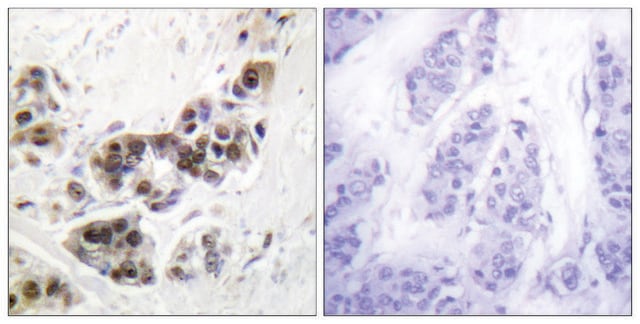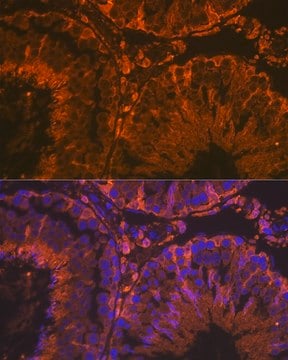推荐产品
生物源
mouse
品質等級
抗體表格
culture supernatant
抗體產品種類
primary antibodies
無性繁殖
133A2, monoclonal
物種活性
rat, mouse, canine, bovine, human
製造商/商標名
Chemicon®
技術
flow cytometry: suitable
immunocytochemistry: suitable
immunohistochemistry: suitable
western blot: suitable
同型
IgG3
UniProt登錄號
運輸包裝
dry ice
目標翻譯後修改
unmodified
基因資訊
human ... LMNA(4000)
一般說明
Nuclear lamins form a network of filaments at the nucleoplasmic site of the nuclear membrane. Two main subtypes of nuclear lamins can be distinguished: A-type lamins and B-type lamins. The A-type lamins comprise a set of three proteins arising from the same gene by alternative splicing, i.e. lamin A, lamin C and lamin Adel 10, while the B-type lamins include two proteins arising from two distinct genes, i.e. lamin B1 and lamin B2.
特異性
Monoclonal 133A2 reacts against human lamin A but not lamin C. The epitope lies with the 98 amino acids of the C terminus that is unique to lamin A. Specifically deletion analysis has shown that amino acids 598-611 were essential for reactivity {Hozak, P et.al. (1995), J. Cell Sci 635-644}.
免疫原
Epitope: C-terminus, a.a. 598-611
Synthetic peptide from the C-terminus of human lamin A. This sequence is not present in the the lamin C isoform.
應用
Immunoblotting: Lamin A detected as a 70kDa protein under reduced conditions.
Immunocytochemistry on fixed cells (methanol/acetone fixation)
Immunohistochemistry on frozen tissue sections.
Optimal working dilutions must be determined by the end user.
Immunocytochemistry on fixed cells (methanol/acetone fixation)
Immunohistochemistry on frozen tissue sections.
Optimal working dilutions must be determined by the end user.
Research Category
Cell Structure
Cell Structure
Research Sub Category
Cytoskeleton
Cytoskeleton
This Anti-Lamin A Antibody, C-terminus, a.a. 598-611, clone 133A2 is validated for use in FC, WB, IC, IH for the detection of Lamin A.
外觀
Format: Purified
Liquid in buffer containing 0.1% sodium azide.
儲存和穩定性
Maintain -20°C in undiluted aliquots for up to 6 months. Avoid repeated freeze/thaw cycles.
其他說明
Concentration: Please refer to the Certificate of Analysis for the lot-specific concentration.
法律資訊
CHEMICON is a registered trademark of Merck KGaA, Darmstadt, Germany
免責聲明
Unless otherwise stated in our catalog or other company documentation accompanying the product(s), our products are intended for research use only and are not to be used for any other purpose, which includes but is not limited to, unauthorized commercial uses, in vitro diagnostic uses, ex vivo or in vivo therapeutic uses or any type of consumption or application to humans or animals.
Not finding the right product?
Try our 产品选型工具.
儲存類別代碼
12 - Non Combustible Liquids
水污染物質分類(WGK)
WGK 2
閃點(°F)
Not applicable
閃點(°C)
Not applicable
Micah J Drummond et al.
Journal of applied physiology (Bethesda, Md. : 1985), 111(1), 135-142 (2011-04-30)
Amino acid transporters and mammalian target of rapamycin complex 1 (mTORC1) signaling are important contributors to muscle protein anabolism. Aging is associated with reduced mTORC1 signaling following resistance exercise, but the role of amino acid transporters is unknown. Young (n
Raju Padiya et al.
PloS one, 9(5), e94228-e94228 (2014-05-07)
Cardiovascular complication due to diabetes has remained a major cause of death. There is an urgent need to intervene the cardiac complications in diabetes by nutritional or pharmacological agents. Thus the present study was designed to find out the effectiveness
Petra Sehnalová et al.
Biology of the cell, 106(5), 151-165 (2014-03-13)
The optimal repair of DNA lesions is fundamental for physiological processes. We asked whether the recruitment of HP1β, 53BP1 and BMI1 proteins to ultraviolet (UVA)-induced DNA lesions requires functional A-type lamins. We found that UVA irradiation of nuclear lamina abolished
Laia Gómez-Baldó et al.
Cell cycle (Georgetown, Tex.), 9(6), 1143-1155 (2010-03-20)
Studies of the role of tuberous sclerosis complex (TSC) proteins (TSC1/TSC2) in pathology have focused mainly on their capacity to regulate translation and cell growth, but their relationship with alterations of cellular structures and the cell cycle is not yet
Jason P Chua et al.
Human molecular genetics, 23(5), 1376-1386 (2013-10-24)
Spinobulbar muscular atrophy (SBMA) is an inherited neuromuscular disorder caused by the expansion of a CAG repeat encoding a polyglutamine tract in exon 1 of the androgen receptor (AR) gene. SBMA demonstrates androgen-dependent toxicity due to unfolding and aggregation of
我们的科学家团队拥有各种研究领域经验,包括生命科学、材料科学、化学合成、色谱、分析及许多其他领域.
联系技术服务部门








